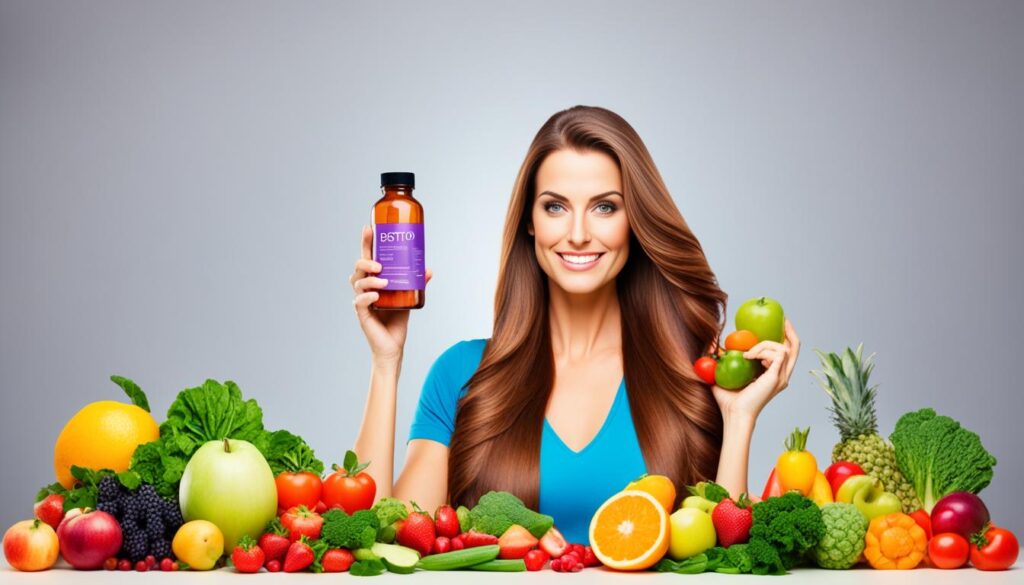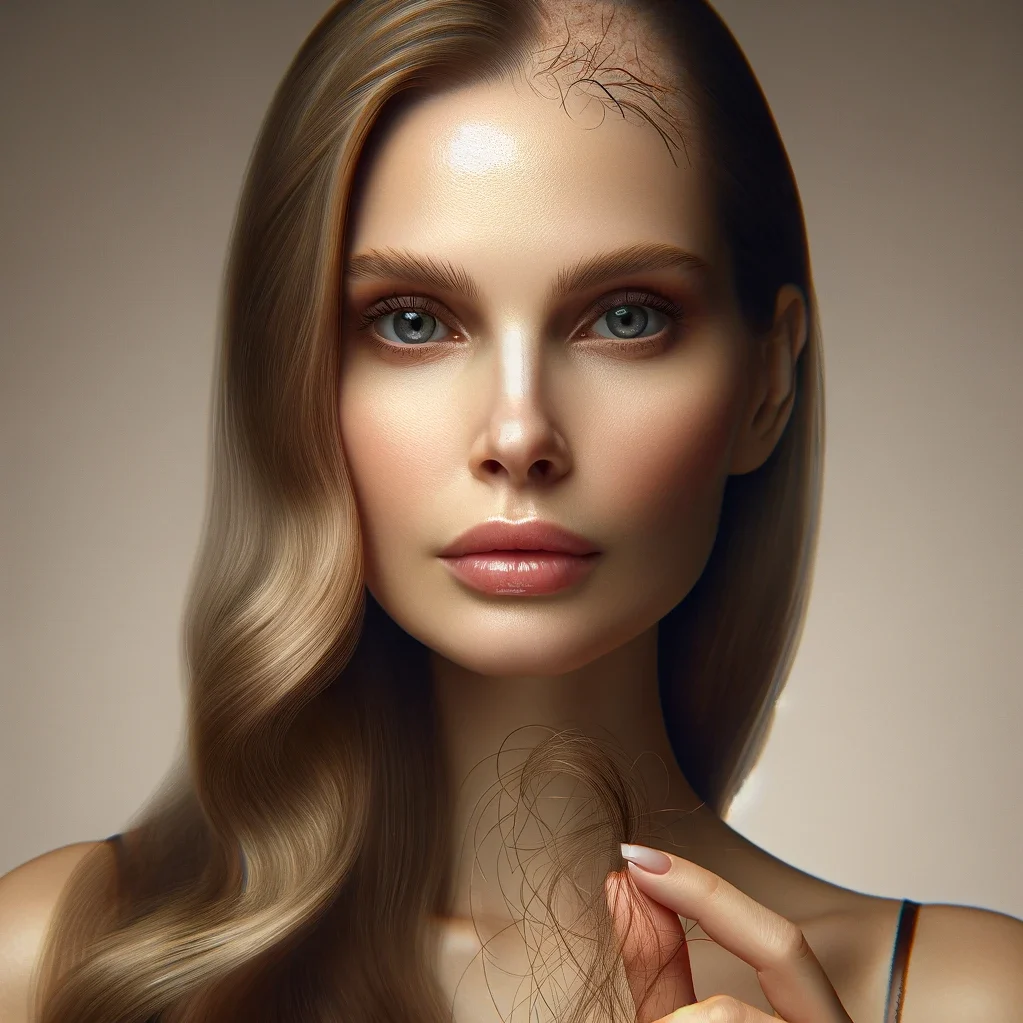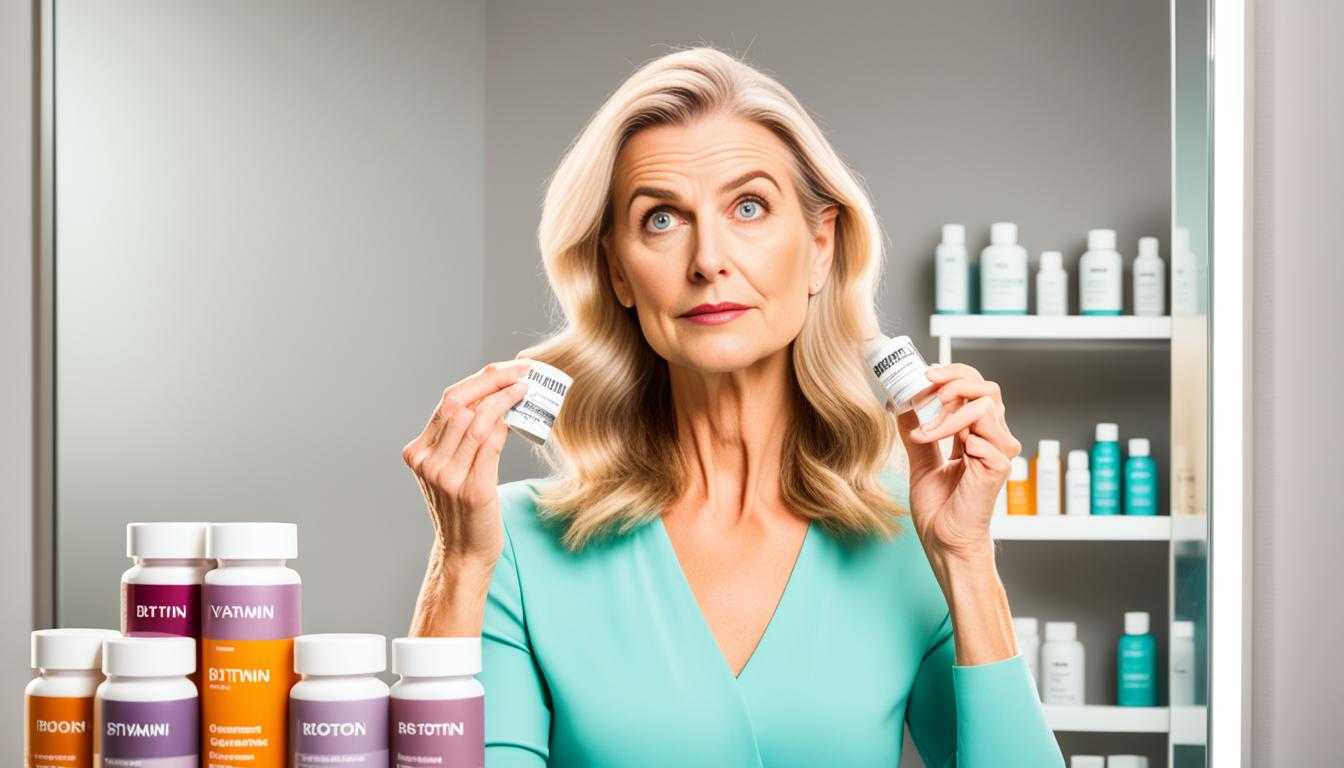Are you one of the many women who have noticed thinning hair or excessive hair loss? You’re not alone. Hair loss is a common condition that affects nearly 40% of women in the United States. It can be distressing and have a significant impact on self-esteem and confidence.
The good news is that there are vitamins and supplements specifically formulated to address women’s hair loss. These products have gained popularity for their potential to promote hair growth, strengthen hair follicles, and improve overall hair health.
Key Takeaways:
- Hair loss affects nearly 40% of women in the United States.
- Vitamins and supplements can help promote hair growth and combat hair loss in women.
- Incorporating specific vitamins into your daily routine can improve the health and thickness of your hair.
- Biotin, vitamin A, C, D, and E, iron, zinc, and DHT blockers are some of the best vitamins and supplements for hair loss in women.
- Consult with a healthcare professional before starting any new supplements.
Biotin – Stimulate Hair Growth from Within
When it comes to promoting hair growth and combating hair loss, one nutrient that stands out is biotin. Also known as vitamin B7, biotin is an essential vitamin that plays a crucial role in maintaining the health of our hair.
Biotin stimulates the production of keratin, a protein that makes up the structure of our hair. This protein is vital for hair growth and strength. Without sufficient biotin, the hair follicles may become weak and lead to hair thinning and loss.
Although biotin deficiencies are rare, they can occur. Certain factors, such as poor nutrition or certain medications, can contribute to a deficiency. If you’re experiencing thinning hair or hair loss, it’s essential to ensure that you’re getting enough biotin in your diet.
Foods rich in biotin include:
- Eggs
- Meat (such as liver and poultry)
- Fish (such as salmon and sardines)
- Nuts (such as almonds and walnuts)
- Sweet potatoes
- Seeds (such as sunflower seeds and flaxseeds)
In addition to incorporating biotin-rich foods into your diet, you may consider taking biotin supplements. These supplements provide an extra dose of biotin, ensuring that your body has an adequate supply to support healthy hair growth and strengthen hair follicles.
By stimulating hair growth from within, biotin can help reverse the effects of hair loss caused by vitamin deficiency. Consistent use of biotin supplements, along with a balanced diet, can lead to thicker and healthier hair over time.

The Importance of Biotin for Hair Health
Biotin’s role in hair health cannot be overstated. This vitamin not only promotes hair growth but also contributes to overall hair health. By strengthening the hair follicles, biotin reduces the risk of hair breakage and helps maintain the thickness and fullness of the hair.
While biotin supplements are generally safe, it’s always best to consult with a healthcare professional before adding any new supplements to your routine. They can provide personalized advice based on your specific needs and help you determine the appropriate dosage for optimal results.
Keep in mind that biotin is just one piece of the puzzle. A comprehensive approach that includes a balanced diet, regular exercise, and proper hair care can help you achieve the best results in combating thinning hair and promoting overall hair health.
Vitamin A, C, D, and E – Nourish and Strengthen Hair
Vitamins A, C, D, and E are essential for promoting hair health and preventing hair loss in women. Each vitamin plays a unique role in nourishing and strengthening the hair follicles, resulting in improved hair growth and overall hair health.
Vitamin A:
One of the key nutrients for hair health, vitamin A helps produce sebum, an oily substance that moisturizes the scalp and keeps hair follicles healthy. By maintaining a well-hydrated scalp, vitamin A promotes hair growth and reduces dryness and flakiness. Incorporate vitamin A-rich foods into your diet, such as sweet potatoes, carrots, and spinach, to ensure an adequate intake of this vital vitamin.
Vitamin C:
As a powerful antioxidant, vitamin C protects hair from oxidative stress caused by environmental factors and free radicals. It also aids in collagen production, a crucial protein for hair structure. Boost your vitamin C levels by consuming citrus fruits, berries, bell peppers, and leafy greens, which will not only support hair growth but also strengthen hair follicles.
Vitamin D:
Vitamin D deficiency has been associated with various hair loss conditions, including alopecia areata and telogen effluvium. It is essential for the hair follicles to go through the hair growth cycle properly. Sunlight and fortified foods, such as fatty fish, eggs, and fortified dairy products, can be good sources of vitamin D. However, if you have a deficiency, consulting with a healthcare professional for appropriate supplementation is recommended.
Vitamin E:
Another potent antioxidant, vitamin E, enhances blood circulation in the scalp, promoting hair growth. It also protects the hair from damage caused by free radicals and supports the overall health of the hair follicles. Incorporate vitamin E into your diet by consuming foods like sunflower seeds, almonds, spinach, and avocados to maintain strong and healthy hair.
Vitamins Checklist for Hair Growth:
| Vitamin | Food Sources |
|---|---|
| Vitamin A | Sweet potatoes, carrots, spinach |
| Vitamin C | Citrus fruits, berries, bell peppers, leafy greens |
| Vitamin D | Fatty fish, eggs, fortified dairy products |
| Vitamin E | Sunflower seeds, almonds, spinach, avocados |
By incorporating these vitamins into your diet, you can nourish your hair from within and strengthen the hair follicles, resulting in improved hair growth and reduced hair loss. Remember to consult with a healthcare professional or a registered dietitian for personalized advice and any necessary vitamin supplementation for optimal hair health.
Iron, Zinc, and DHT Blockers – Target Underlying Causes of Hair Loss
Losing hair can be a distressing experience for women, and addressing the underlying causes is essential for regaining hair health. Iron deficiency is a common culprit behind hair loss in women. Including iron-rich foods like red meat, lentils, and spinach in your diet can help prevent hair loss and promote growth.
Zinc is another vital nutrient that plays a crucial role in hair growth. It helps maintain healthy oil glands around hair follicles, ensuring optimal hair health. Incorporating zinc-rich foods such as oysters, spinach, and pumpkin seeds into your diet, or taking zinc supplements, can help combat hair loss caused by zinc deficiencies.
Hormonal imbalances, specifically the hormone DHT (dihydrotestosterone), can also contribute to hair loss. Certain supplements, like those containing saw palmetto, act as DHT blockers, reducing hair loss caused by hormonal imbalances. Incorporating these hair loss supplements into your routine can help address the underlying causes of hair loss in women.
FAQ
What are the best vitamins for hair loss in women?
The best vitamins for hair loss in women include biotin (vitamin B7), vitamins A, C, D, and E, iron, zinc, and DHT blockers such as saw palmetto.
How does biotin stimulate hair growth?
Biotin stimulates the production of keratin, a protein that makes up the structure of hair, promoting hair growth and strengthening hair follicles.
What are the benefits of vitamins A, C, D, and E for hair health?
Vitamin A helps produce sebum, an oily substance that moisturizes the scalp and keeps hair follicles healthy. Vitamin C is an antioxidant that protects hair from oxidative stress and aids in collagen production. Vitamin D deficiency has been linked to hair loss conditions, so adequate intake is important. Vitamin E is another powerful antioxidant that promotes hair growth and prevents damage.
How does iron deficiency contribute to hair loss in women?
Iron deficiency can lead to hair loss, especially in women. Adding iron-rich foods like red meat, lentils, and spinach to your diet can help prevent hair loss.
How does zinc promote hair growth?
Zinc promotes hair growth and keeps oil glands around the hair follicles healthy. Zinc deficiencies can contribute to hair loss, so incorporating foods like oysters, spinach, and pumpkin seeds into your diet or taking zinc supplements may be beneficial.
What are DHT blockers and how do they help with hair loss?
DHT (dihydrotestosterone) is a hormone that contributes to hair loss. Some supplements contain DHT blockers, such as saw palmetto, that can help reduce hair loss caused by hormonal imbalances.

